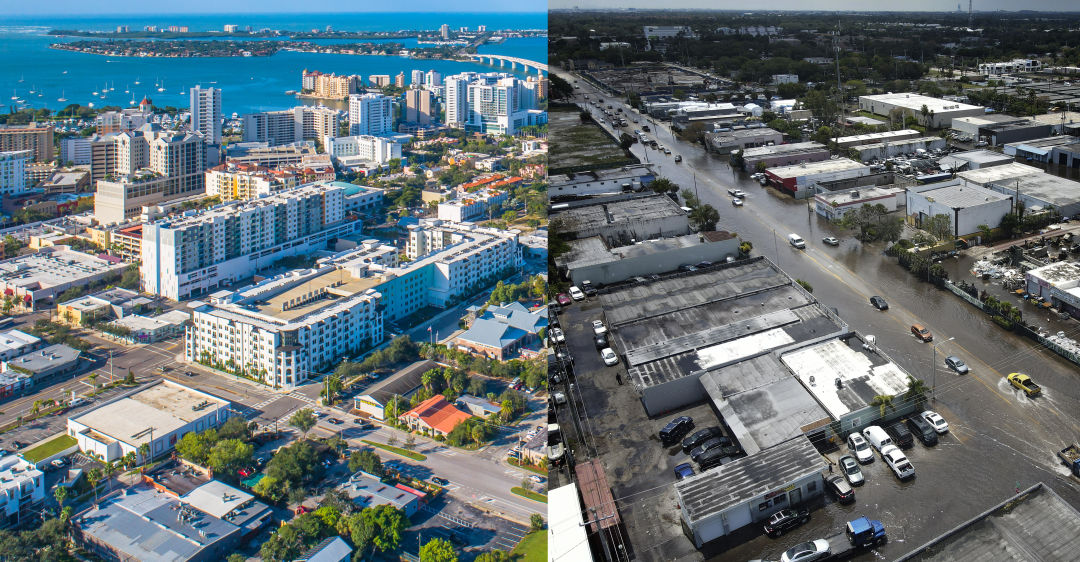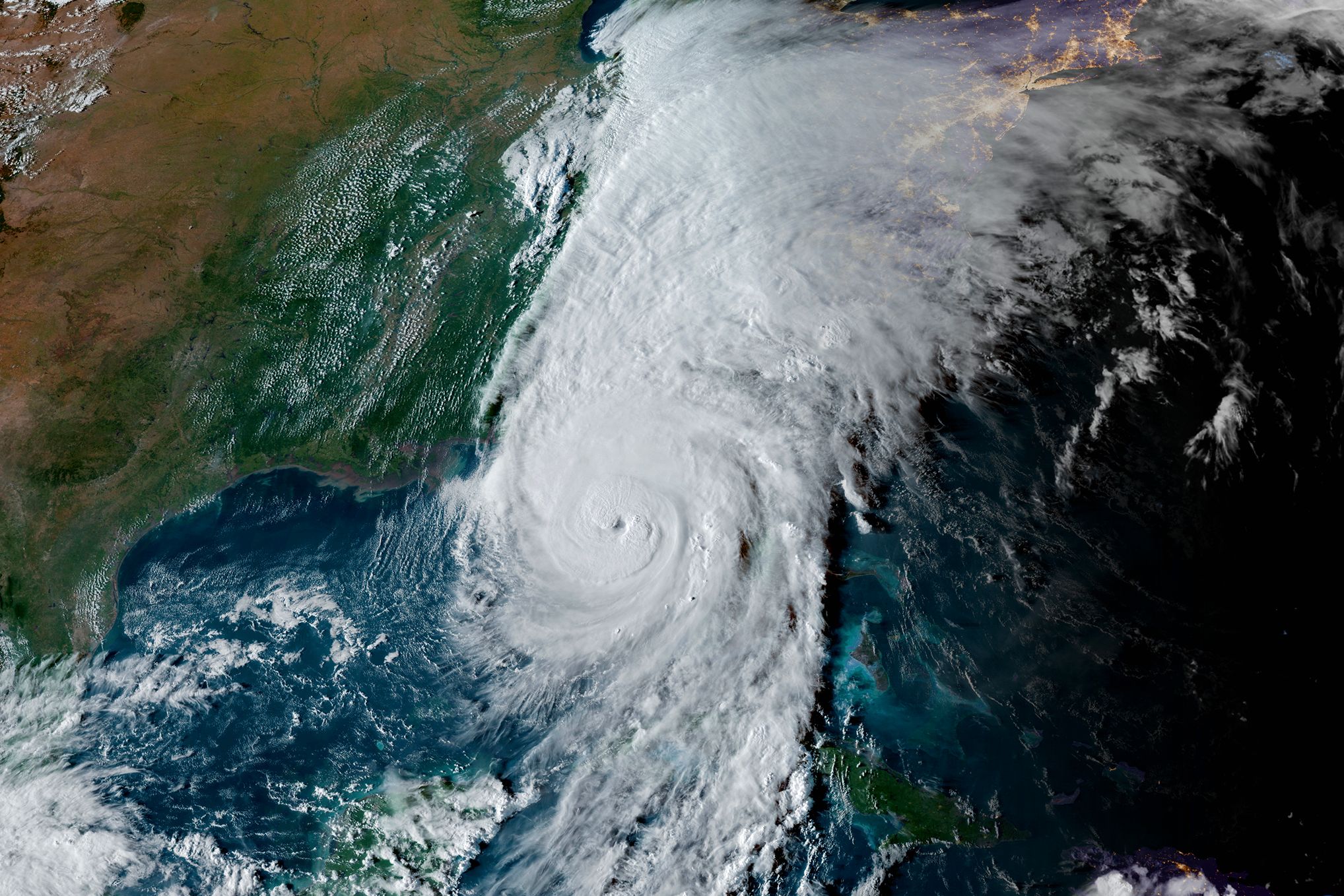Could the Catastrophic Flooding in Fort Lauderdale Happen in Sarasota?

Image: Gigi Ortwein
Two weeks after record-breaking rainfall overwhelmed Fort Lauderdale, the coastal city is still wet and moldy. Officials called it a “1,000-year storm.” More than 2 feet of rain fell in less than 24 hours, choking stormwater systems, shutting down Fort Lauderdale International Airport and submerging entire neighborhoods in water 37 times dirtier than you might find in a toilet.
As development makes Sarasota look more and more like Fort Lauderdale with each passing year, could Sarasota one day find itself underwater as storms intensify in frequency and strength? We spoke with city officials, a meteorologist, and environmental and conservationist advocates to find out.
Bob Bunting, Meteorologist and chief executive officer of the Climate Adaptation Center
Can extreme flooding and stormwater failure happen here?
"It absolutely can happen here. And it will happen here. It’s just a matter of time. We missed two big inland floods during Hurricane Ian. We were also in the tropical system that hit Fort Lauderdale, but we didn’t get the storms. That was 25 inches of rain in 10 hours. It can happen here too."
The mayor of Fort Lauderdale called the storm “a thousand year rain event.” Is it dishonest to refer to these storms as 1,000-year, or even 100-year, events?
"The thing is, these 100-year floods are happening every five to 10 years. And that’s because the way they calculate 100-year floods is with statistics that are old. And since those statistics were calculated, the climate has already changed. So now, every degree of warming we add to the climate gets us 7 percent more water in the atmosphere per unit volume. So that means when it gets concentrated by thunderstorms, by hurricanes, by cold fronts, we can get copious amounts of rain quickly."
What has Sarasota done to prepare for these future storms?
"The infrastructure along 41 was raised several feet, which was terrific, but the most important part of that infrastructure is the emergency routes leaving the keys to get onto the mainland. The area over there by Golden Gate Point, that area is very low and you can see the water from the bay against the wall. When we have a full moon with no storm, it’s less than a foot from the road surface. That road really is an urgent road to raise because it’s an escape route for thousands of people in the event of a hurricane, not even a major hurricane, any hurricane.
"Our system is tuned to the 1990s climate, not to the 2020s climate, and certainly not the 2050s climate. We are behind the eight ball and we have to modernize our processes."
What are some ways we can mitigate the consequences of these storms?
"We need as much green space as we can because it absorbs the water, cleans it before it goes into the bay and really helps with flood control. So paving over every block and putting 18-story buildings on every piece of land, while it may be nice for some, is not great when we have an emergency situation."
Glenn Compton, chairman of ManaSota-88, an environmental advocacy organization
You have said that you are certain the flooding that occurred in Fort Lauderdale will happen here in Sarasota. Why?
"Historic mistakes were made in developing Sarasota and these mistakes cannot be easily corrected, and there is no reason to believe we will change our lifestyle or land use patterns because of the increase in flooding due to climate change. The increase in population and the continued development over the past few decades leave the residents of Sarasota extremely vulnerable to the devastating effects of flooding.
"Sarasota has allowed development in low and coastal areas which will result in catastrophic losses if a major storm were to occur. In short, the state and local governments have taken far too little interest in preparing for and safeguarding against the next major storm event."
What mistakes do we continue to make?
"There appears to be no consideration given to this problem when approving new developments. Ignoring the probability of property damage, human injury and death, the costs to taxpayers of subsidizing development in flood-prone areas are enormous. One thing for certain is it will be more expensive to live in Florida. We have already seen a dramatic increase in property insurance rates and insurance companies canceling policies by the thousands. As additional people move into our area, there will be an increased threat of extensive loss of life and property damage."
What can we do to address these problems?
"There are no easy answers to the problems of overdevelopment of the flood-prone areas in our region. Comprehensive plans should prohibit the construction of new development in low-lying areas and designate these areas for conservation, recreation and open space. We need to reduce pollution, increase energy efficiency and plant more native vegetation on lands that have been degraded."
Nikesh Patel, Sarasota City Engineer
What has the City of Sarasota done to mitigate potential catastrophic flooding?
"The city has continually worked with partners: the Army Corp of Engineers, the Florida Department of Environmental Protection, the Florida Department of Transportation—all these partnerships that happen within the state have a resiliency component in there. So far, work has been done on U.S. 41, with the 10th, 14th and Gulfstream roundabouts, and they all address some of those issues."
What kinds of projects is the city working on in the near future?
"The current projects that are underway addressing some of these issues are the Bobby Jones Nature Park. Another big component is the Bay Park Conservancy. And we received $2.5 million from the state and the city's going to match another $2.5 million to analyze the entire city to look at existing flooding areas, look at vulnerable areas and evacuation routes, as well as vulnerable facilities such as hospitals and government facilities."
How can mitigation efforts keep up with our rampant development?
"These projects take major investments. Development is going to come in across the state of Florida, and as it comes in, the standards that we are overseeing in the City of Sarasota, we are going to be addressing some of these items that address the water quality issues and that aspect of it."
Bob Bunting points to Gulfstream Avenue near Golden Gate Point as a vulnerable area for flooding that is also an evacuation route. Is there anything being done to fix that?
"I would agree with him. FDOT is working on a project after Gulfstream, two years from now, [that will make] improvements on that intersection to address those issues. It’s not that there aren’t valid concerns, but as funding becomes available, and projects come online, they are being addressed. It’s all tied to funding. Absolutely, you can keep up [mitigation with the pace of development] as quickly as it happens, but it’s all tied to funding."
Jen Ahearn Koch, City Commissioner
Besides telling people they can’t build even in low-lying areas that are prone to flooding, what options do we have?
"The more realistic thing we can do is to insist on better building codes. The City Commission asked that we do a green building code. We are in the middle of getting a consultant and getting a new building code. Hopefully, we won’t get preempted at the state level."
Is development outpacing our ability to mitigate and be resilient?
"Good question. I’m not sure I’m qualified to answer that. Not yet. I think we are going to reach a tipping point, because of the way we need to add services for each person that moves here. We keep adding people and adding housing until we have to say stop instead of planning for it along the way. We can do a better job. We are trying as a city, but we have these property rights. They’re allowed to build 18 stories. We can’t say no."
Should the recent storm give us pause?
"Absolutely. Absolutely. We need to look at everything we can do to be resilient and respond to this and be responsible to our citizens and their safety.
"[According to FDEP standards], you’re allowed to have zero standing water on evacuation routes. You’re allowed to have 12 inches of standing water on neighborhood streets. How are the neighborhoods going to get to the evacuation routes if there are 12 inches of water? Why is that a standard? The answer is money. It would cost $200 million to raise all of the neighborhood roads to meet that standard. Nobody has that."
Jon Thaxton, senior vice president for community investment at the Gulf Coast Community Foundation
What puts Sarasota at risk for flooding?
"We have a stormwater system that was built between the 1940s and 1970s with absolutely zero consideration that the bay waters were going to rise. We have a remarkably flat topography with minimal opportunity for relief to move water from the hinterlands into the bay. We also have a derelict stormwater system that, even if it was designed to accommodate sea level rise, it’s going to fail, because it’s still so old. We have this antiquated stormwater conveyance system designed at a time when there was zero thought of bay level rise that would create a backup in that stormwater system. It will be remarkably expensive to fix."
Can we avoid the same fate as Fort Lauderdale?
"It’s too late. It already has happened—it just hasn’t been built yet. We have duplicated Fort Lauderdale in our collective comprehensive plans. It’s all approved. The only difference is Fort Lauderdale is largely built and ours is approved and waiting to be built. Get used to it. People complain about the traffic today. You haven’t even seen any traffic compared to what you’re going to see."
What concerns you the most?
"This will disproportionately impact cost-burdened households in Sarasota. The working poor, the minimum wage workers, those are the people who are going to get hit first, hit hardest and hit the longest.
"I’ve been doing this for 43 years now. You can't help but think that the systems are kind of rigged, and not rigged in a malicious way, but designed in a way that this favors the private interests over the public. It’s really unfortunate to say, but I don't know how you can come to any other conclusion."



